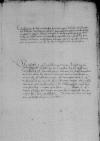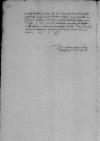 APG 300, 53, 267, p. 87
APG 300, 53, 267, p. 87
Unsern freuntlichen grus und alles gut zuvoran. /
Ersame, namhafftige herren, besondere, guthe freunde. /
Wir haben gestriges tages Ewer E(rbarkei)t ⌊⌋, dat(um) XVII dits monts, entpfangen und des inhalt wol vorstanden. / Auch wisse wir uns wol zuerinneren, was der schiffart halben der edele, ernvhest h(er) ⌊Iohan von Werden⌋, burgermeister etc. unser geliebter freundt mit uns vortrawter weiss geredt, / das von uns nicht ane ursache vorblieben ist an hoff zu schreiben und dieweil wir doraus ermercken, / das kein vorbott der ausschiffung von E(wer) E(rbarkei)t geschen, / nimpt uns wunder, / wie solchs in den ⌊reichstag⌋ gen ⌊Kracko⌋ gekommen etc.
Wollen auch derwegen E(wer) E(rbarkei)t unschult mit eygenem botten, den wir im kortzen an hoff zuschicken vorgenomen, an tag zu brengen nicht nachlassen, / wiewol wir dem hochwirdigen hern ⌊undercantzler⌋ den XII dits mondts mit ko(nigliche)m kemmerer, der uns koniglich mandat in dem falh an die ⌊herren rethe⌋ solch vorbott betreffend uberantwort, wie eingelegte copei meldet, ⌊⌋. / Wir wolten uns jo gerne E(wer) Er(barkei)t so vil uns muglich und zimlich vorhalten, dorinne uns nichts sol irren, so der ⌊unchristlich monch⌋ mit seinem unreinen leben und widder die heiligen der christlichen kirchen sacrament, die er itzt offentlicher und schandlicher weiss dan zuvor, nemlich widder die representacion des leyden ⌊Christi⌋ der heiligen messen in seinem unwarhaftigen predigen lestert, / uns nicht im gemuet thet beledigen, / das wir in ruhe der vorsorg halben nicht mugen haben beforchtende, das nicht etwas E(wer) E(rbarkei)t und unserm ⌊vaterlande⌋, der guthen stadt, der wir so vil guts also yemants aus E(wer) E(rbarkei)t mittel gonnen, / des text damaged⌈[des]des text damaged⌉ vorgangen unfalhs nicht zukommen [...] text damaged⌈[...][...] text damaged⌉  APG 300, 53, 267, p. 88 sorgfeldigkeit wolde E(wer) E(rbarkei)t, wie wir uns vorsehen, geschicht neben und mit uns tragen, / und dieselbte uns zu gute halten, / das wir so gantz trewhertziger meynunge E(wer) E(rbarkei)t, die wir gotlichen gnaden befelhen, / nicht haben mugen unangezeigt lassen. /
APG 300, 53, 267, p. 88 sorgfeldigkeit wolde E(wer) E(rbarkei)t, wie wir uns vorsehen, geschicht neben und mit uns tragen, / und dieselbte uns zu gute halten, / das wir so gantz trewhertziger meynunge E(wer) E(rbarkei)t, die wir gotlichen gnaden befelhen, / nicht haben mugen unangezeigt lassen. /
 APG 300, 53, 267, p. 89
APG 300, 53, 267, p. 89
Co(m)missionem de hinc emittendis frumentis quae ⌊Vistula⌋ advehuntur ad ⌊d(omi)nos hic consiliarios⌋ referam, / quomodo vero exteris emitti debea(n)t / temporu(m) cu(m) negotio Danico ratione no(n) habita / quu(m) apud nos illoru(m) conspicua est paenuria / et cataclismi aquaru(m) irrecuperabilia detrimenta intulerint / indiscussum relinquo / operam equidem daturus sum ut quantu(m) in me est ⌊s(erenissimae) or s(acrae)⌈s(erenissimae)s(erenissimae) or s(acrae)⌉ m(aiesta)tis regiae⌋ voluntati satisfiat. /
Wir schicken E(wer) E(rbarkei)t widderumb diesen brieff unser freundschafft besibbung und wissen, das die recht und warhaftig ist. Frembde zeuge, dieweil die sache voraldert und die alten, die dorumb gewust, dovon vorstorbenn, / sein nicht zu uberkommen. / Vil weniger wirt E(wer) E(rbarkei)t underscholtz von seiner hausfrawen wegen, / die nichts, wie uns wol wissentlich, in die sibbe gehort, / recht und warhafftig mugen gut thun. Bitten E(wer) E(rbarkei)t dorein zusehen, das unser armen freundschafft vor gerichte kein kurtz geschehe, / das wir uns im grossern zubeschuldigenn erbittenn. /
 APG 300, 53, 267, p. 88 sorgfeldigkeit wolde E(wer) E(rbarkei)t, wie wir uns vorsehen, geschicht neben und mit uns tragen, / und dieselbte uns zu gute halten, / das wir so gantz trewhertziger meynunge E(wer) E(rbarkei)t, die wir gotlichen gnaden befelhen, / nicht haben mugen unangezeigt lassen. /
APG 300, 53, 267, p. 88 sorgfeldigkeit wolde E(wer) E(rbarkei)t, wie wir uns vorsehen, geschicht neben und mit uns tragen, / und dieselbte uns zu gute halten, / das wir so gantz trewhertziger meynunge E(wer) E(rbarkei)t, die wir gotlichen gnaden befelhen, / nicht haben mugen unangezeigt lassen. /



